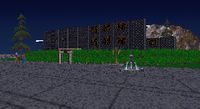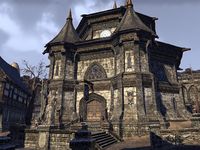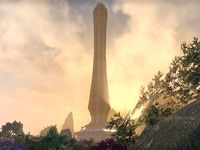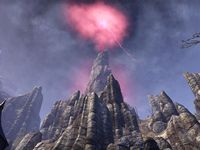Lore:Gyron Vardengroet
| Gyron Vardengroet | |||
|---|---|---|---|
| Race | Breton | Gender | Male |
| Born | 2nd Era Moonguard |
||
| Appears in | The Sage Feyfolken The Final Lesson |
||
Gyron Vardengroet is an immortal Breton wizard of legend that was born in the early years of the Second Era,[nb 1] and was prophesied by the Gods as a champion that would be sent down to guide others and bring wisdom. His exploits would earn him the title of The Sage,[1] and Great Sage.[2][3] Physically, he is described as a tall, bald, and bearded[2] Breton with dark eyes, an indigo robe trimmed with gold, a pointed wizard's hat, and an intricately carved staff.[1] He is the primary figure in the books The Sage, Feyfolken, and The Final Lesson. Gyron has monuments erected in his reverence in both High Rock and Hammerfell.[4] He was listed alongside Voernet and Druid King Kasorayn as one of the most powerful Breton mages in history. According to Divayth Fyr, "Gyron Vardengroet" was not his real name.[5]
History[edit]
Ascension[edit]
The Sage tells the story of Gyron Vardengroet's early life and his eventual career as a preeminent mage. Gyron was born during an eclipse of the moons to a poor and humble Breton couple named Frieda and Horstle Vardengroet, in the village of Moonguard, located in the city-state of Camlorn of High Rock. While Bretons are known for their innate magical abilities, he showed magical talent from an extremely young age. At the age of one, he was found levitating a dog. Seeing Gyron's untapped potential, he was taken in by Grungdingler, the village wizard, who honed his skills. After his pupil surpassed him, Grungdingler no longer had anything left to teach him, and he was left unsettled when Gyron started ponder "questions about life, death and immortality." Regardless, the wizard wrote a letter of recommendation on behalf of his apprentice to Morkledder, the Guildmaster of the Mages Guild of Shornhelm, and Gyron departed from Moonguard in further pursuit of knowledge.
At the Mages Guild in Shornhelm, Gyron was challenged by the Council of Three to complete a set of tasks to prove his worth as a mage, which Gyron accepted, and he left Shornhelm in hopes of completing these goals. A few years later, he returned, exceeding expectations, as no novice had ever succeeded in this test, and he was promoted to the rank of a full Wizard. Gyron remained in the Mages Guild for several years, until Morkledder himself admitted that Gyron had surpassed him, and recommended that his pupil study at the Crystal Tower in the Summerset Isle.
During his subsequent journey, which took several years, Gyron had many adventures as he traversed Hammerfell, where he exchanged knowledge with other mages. He also heard tales of plants and herbs which, when combined, could restore life to the dead or even grant immortality. His reputation grew due to his exploits, and when he finally arrived at the Crystal tower he was greeted by a large crowd of mages. He was then admitted to the Crystal Tower by Esthlainder, the Elder of the Council of Wizards.
Esthlainder explained to him that his coming had been foretold by prophecy, which told of the Gods sending one of their own down to Nirn to provide guidance, knowledge, and aid. Though Gyron found this hard to believe, he agreed to stay and study at the Crystal Tower for some time. Eventually Gyron surpassed even the mages of the Crystal Tower, and Esthlainder informed him the Tower could offer nothing more for him that he did not already know. Esthlainder told Gyron that only by traveling throughout Tamriel itself could he seek further wisdom and knowledge. Though he was sad to see Gyron leave the Crystal Tower, the Elder gave him three gifts: an indigo robe trimmed with gold, a pointed wizard's hat, and an intricately carved staff, all identical to those in Esthlainder's possession. From that point on, Gyron would be known as The Sage.[1]
The Sage[edit]
The Sage returned to his home village of Moonguard, where celebrations were held on his behalf. Afterwards, he settled into the cottage the villagers had built for him outside Moonguard for a few years, accepting any that sought out his wisdom. The eventual deaths of his parents devastated him, prompting him to spend the rest of his life seeking out a cure to mortality, so that no one would have to experience his grief. Indeed, The Sage recalled the tales of the herbs that could cure such an ailment, and returned to the Crystal Tower to study tomes on flora, using himself as a test subject in hopes to find the right combination. At some point, he eventually realized that he was no longer aging - he had succeeded in granting himself immortality. However, he did not know which of the myriad of alchemical combinations he had tried had worked.
Despite his dream being within reach, the years continued to pass. His fame grew to be unmanageable in that time. As as result, he retreated into a magical fortress he built in the Kurallian Mountains, where only the most worthy of mages could reach him. Though he had secured peace for himself in order to continue his research, true to his heart he still journeys out of his fortress at times, helping young mages gain experience and learn.[1]
The Sage would later take in two pupils by the name of Taksim and Vonguldak. One of his lessons to them concerned the story of Feyfolken, a Daedric servant of Clavicus Vile whose soul was used to enchant a quill.[2] The Sage used this story as an object lesson to explain the dangers of unregulated magic, and the necessity of understanding the forces with which one enchants an object.[2]
Near the end of Taksim and Vonguldak's apprenticeship, the Sage told the story of Loreth and Uthrac to his two pupils, who did not want to leave him. Far back in the First Era, the onslaught of the Alessian Order against mages led Dalak, the master of Uthrac and Loreth, to send his students on a mission to rescue Peothil, another mage in hiding from the Order. Like Taksim and Vonguldak, the two students were reluctant to leave Dalak, and eventually Uthrac stayed behind while Loreth ventured out alone to find Peothil in the Colovian Estates. Despite the growing danger presented by the Alessian Order, Loreth eventually found Peothil's hiding place in Colovia, though the enchanter had already perished long ago, presumably from a failed enchanting experiment. Realizing he was trapped by the Alessian Order, Loreth used what he learned from his lessons to magically hide Peothil's laboratory, and the Order never discovered it. Ironically, Peothil had tried doing the same thing, but a minor error on his part led to his death.
After the Alessian Order was defeated at the Battle of Glenumbra Moors, Loreth was already an old man, but he journeyed back to Dalak and Uthrac, only to find that Dalak had passed only a few months before his arrival. Uthrac and Loreth discovered they now held different passions and interests and parted ways. Uthrac carried on Dalak's work and eventually became an enchanter in the service of Clan Direnni, while Loreth pursued new discoveries and eventually created the Staff of Chaos. The Sage's lesson to Taksim and Vonguldak was to try to avoid small but essential errors that could have unimaginable consequences, like the one that claimed Peothil's life, but that they should never be afraid to try out all possibilities on their own in order to become great.[3]
Notes[edit]
- and he was already a legend by the time of Divayth Fyr's correspondence for the University of Gwylim in 2E 582.[5]
- Gyron Vardengroet was named after Gary Vandegrift, a member of the beta testing group known as the Council of Wisdom for earlier Elder Scrolls games, many of whom lent their names to important figures such as the Divines.
References[edit]
- ^ a b c d The Sage — Aegrothius Goth
- ^ a b c d Feyfolken — Waughin Jarth
- ^ a b The Final Lesson — Aegrothius Goth
- ^ Sage shrine locations in Daggerfall
- ^ a b Loremaster's Archive - House Telvanni — Divayth Fyr
- ^ Mages Guild Charter
Note: The following references are considered to be unofficial sources. They are included to round off this article and may not be authoritative or conclusive.
|
||||||||||||||||||||||||||



